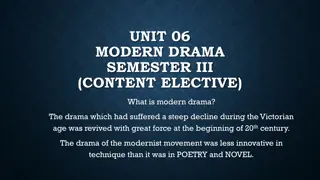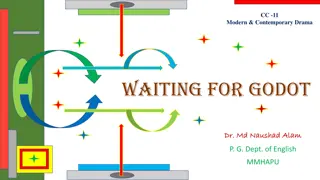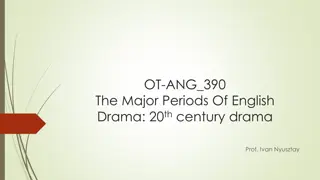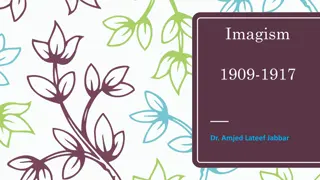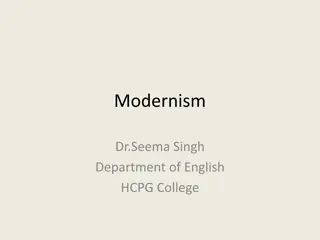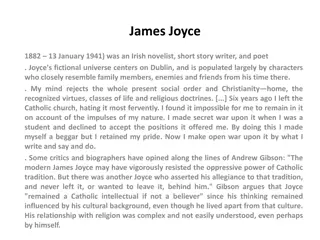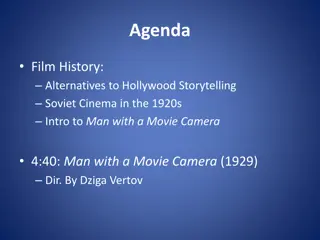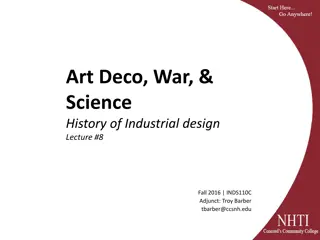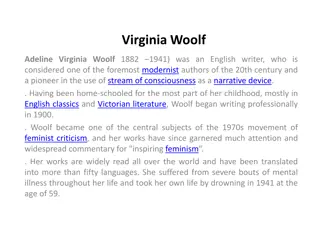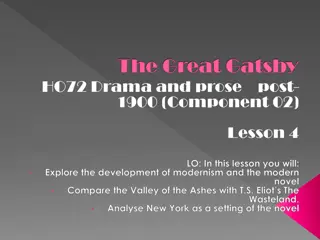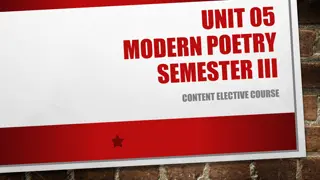Ernest Hemingway: Iconic Writer of the Lost Generation
Ernest Miller Hemingway, born in Oak Park, Illinois, was a prominent writer of the Lost Generation. His experiences in World War I influenced his writing style, marked by simplicity and objectivity. Moving to Paris, he mingled with Modernist artists and revolutionized American fiction. The Lost Gene
2 views • 24 slides
Evolution of Modern Poetry in the 20th Century
Modern poetry in English emerged in the early 20th century as a reaction to Victorian formalism. Modernists drew inspiration from diverse literary traditions, including Greek, Chinese, and Japanese poetry, to create works that depicted social changes and the impact of World War I. Themes of material
1 views • 7 slides
Exploring Modern Drama: History and Characteristics
Modern drama, revived in the early 20th century after a decline in the Victorian age, encompasses realism, plays of ideas, romanticism, and poetic elements. English drama during the modernist period is categorized into phases marked by influential playwrights like Henrik Ibsen, G.B. Shaw, T.S. Eliot
0 views • 9 slides
Understanding Samuel Beckett's Waiting for Godot: A Modernist Masterpiece
Samuel Beckett, a prominent modernist writer, crafted the groundbreaking play "Waiting for Godot" as a tragicomedy in a theater of the absurd. Set in a vague time and place, the play reflects the post-World War II disillusionment and existential themes. Beckett's experimental approach challenges tra
1 views • 16 slides
Evolution of English Drama in the 20th Century: Shaw, Ibsen, and Modernist Theatre
The 20th century English drama witnessed significant shifts, from the realism and naturalism of George Bernard Shaw and Ibsen to the modernist theatre of Samuel Beckett, Tom Stoppard, and Harold Pinter. Themes of social change, rejection of traditional ideals, and a focus on human experiences domina
0 views • 39 slides
Imagism: A Brief Overview of a Modernist Poetry Movement
Imagism was a poetic movement that flourished in Britain and the United States between 1909 and 1917, aiming to break away from the sentimentality of Victorian poetry. Influenced by French symbolists and Japanese haiku, imagist poets like Ezra Pound and Amy Lowell focused on creating concise, vivid
3 views • 21 slides
Key Figures of Modernism in Literature
Explore the prominent figures of Modernism in literature, including T.S. Eliot, W.B. Yeats, James Joyce, and Virginia Woolf. Discover their significant works that shaped the Modernist movement and revolutionized the literary world.
0 views • 15 slides
The Literary Universe of James Joyce
James Joyce, the renowned Irish novelist, short story writer, and poet, crafted a fictional realm centered around Dublin, populated by characters reflecting individuals from his past. His works, including "Dubliners" and "Ulysses", delve into themes of national identity, epiphanies, and intricate na
0 views • 5 slides
The Waste Land by T.S. Eliot: A Modernist Masterpiece Examined
The Waste Land" by T.S. Eliot, published in 1922, is a seminal work of Modernist poetry that offers a bleak portrayal of modern life. This poem, heavily influenced by Ezra Pound's editing, delves into themes of societal decay, spiritual emptiness, and the search for renewal. Pound's collaboration wi
0 views • 26 slides
Exploring Alternative Narratives in Early 20th Century Cinema
Delve into the world of Soviet Montage, German Expressionism, and French Impressionism as we examine the emergence of avant-garde filmmaking and modernist aesthetics in the 1920s. Discover the evolution of film history through experimental and documentary approaches, challenging traditional Hollywoo
0 views • 16 slides
Evolution of Design Movements: Art Deco, War Influence, and Industrial Progress
Explore the emergence of the Art Deco movement post-World War I, its fusion of modernist styles with luxury craftsmanship, and the impact of key figures like Hermann Muthesius on industrial design. Delve into the International Exhibition of Modern Decorative and Industrial Arts in 1925, showcasing a
0 views • 21 slides
The Life and Legacy of Virginia Woolf
Virginia Woolf, an English writer and modernist pioneer, made significant contributions to literature with her innovative use of stream of consciousness. Despite battling mental illness, Woolf's works continue to inspire feminist critique and are celebrated globally. Educated in Greek, Latin, and hi
0 views • 10 slides
Analysis of Virginia Woolf's Novel "To the Lighthouse
Explore the themes, characters, and narrative structure of Virginia Woolf's novel "To the Lighthouse." Learn about the author's life, writing style, and key facts regarding the novel's publication. Delve into the three parts of the story, focusing on the Ramsay family dynamics and the character of L
0 views • 16 slides
Exploring Modernism and the Modern Novel in The Great Gatsby
This lesson delves into the development of modernism and the modern novel through a comparison of The Great Gatsby's Valley of the Ashes with T.S. Eliot's The Wasteland. It discusses the transition from Romanticism to Realism to Modernism in literature, highlighting how Fitzgerald merged poetic Roma
0 views • 7 slides
Rabindranath Tagore: The Iconic Man of Letters and His Political Stand
Rabindranath Tagore, the Nobel Prize-winning poet, novelist, and painter, was a modernist humanist who criticized extremist nationalism. He founded Viswa Bharati University as a radical educational experiment. The context of his time, including the Jallianwala Bagh Massacre and the Swadeshi Movement
0 views • 15 slides
Exploring Modernist Poetry and Its Characteristics
Modernist poetry emerged mainly in Europe and North America between 1890 and 1950, marked by experimentation in form and themes. Modernist poets like T.S. Eliot focused on intellect over emotion, alienation, and isolation. The term "modern" in poetry encompasses various trends like stream of conscio
0 views • 11 slides

